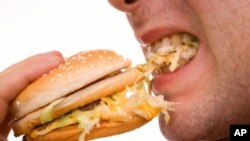High-calorie food can be just as addictive as drugs and cigarette smoking. That's according to a new study, which found that compulsive eating is regulated by the same brain region that's responsible for substance abuse. Researchers say the finding could lead to more effective treatments for obesity.
Scientists have long known that drug addiction is the result of a dysfunction in the brain's reward system that produces powerful cravings for narcotic substances such as heroin, cocaine or the nicotine in tobacco products.
Now researchers have found that the defective mechanism that's responsible for substance abuse is also involved in compulsive eating, which can lead to obesity.
In a study involving rats, investigators found that unlimited access to high-fat foods triggered an addiction-like response in the animals' brains, and they continued to eat even when threatened with an electric shock.
David Shurtleff is director of the basic neuroscience and behavioral division of the US National Institute on Drug Abuse, which funded the study.
"Extended access to fatty foods cannot only as we all know affect your waistline. But it's also affecting your dopamine reward system as well," he said.
Dopamine is an important brain chemical that helps to transmit signals throughout the brain's neural network. It plays a major role in mood regulation, and in the development of drug and alcohol dependence.
A study by researchers at Scripps Research Institute in Florida found that increased levels of the feel-good brain chemical were released in rats exposed to unlimited quantities of food.
In the study, three groups of identical male rats were given as much lean laboratory chow as they wanted. But the scientists also gave one group of animals high-fat foods for up to one hour per day while a second group of rats had unrestricted access to high fat, cafeteria-style foods around the clock.
Forty days later, the unrestricted rodents gained significantly more weight than the other two groups. The rats also began to eat compulsively in response to the dysfunction in their reward system caused by overeating. Scientists found the fatter the rats became, the more food they ate to satisfy their craving.
Shurleff says the study confirms the importance of the dopamine pathway in regulating addictive behaviors, including eating.
"What it's really pointing to, this study along with many others, is showing us that the dopamine system is important in pathological [disease] behaviors such as compulsive eating as well compulsive drug-taking," he explained. "The next step would be to target this receptor in some way to learn more about how it functions in the brain and develop treatments for obesity and addiction."
Interestingly, Shurtleff says studies have shown that the chemical reward system is also dysfunctional in people with the eating disorder anorexia, where they refuse to eat and become emaciated. Their brains release too little dopamine.
The study on the cause of food addiction and compulsive eating is published in the May issue of Nature Neuroscience.








